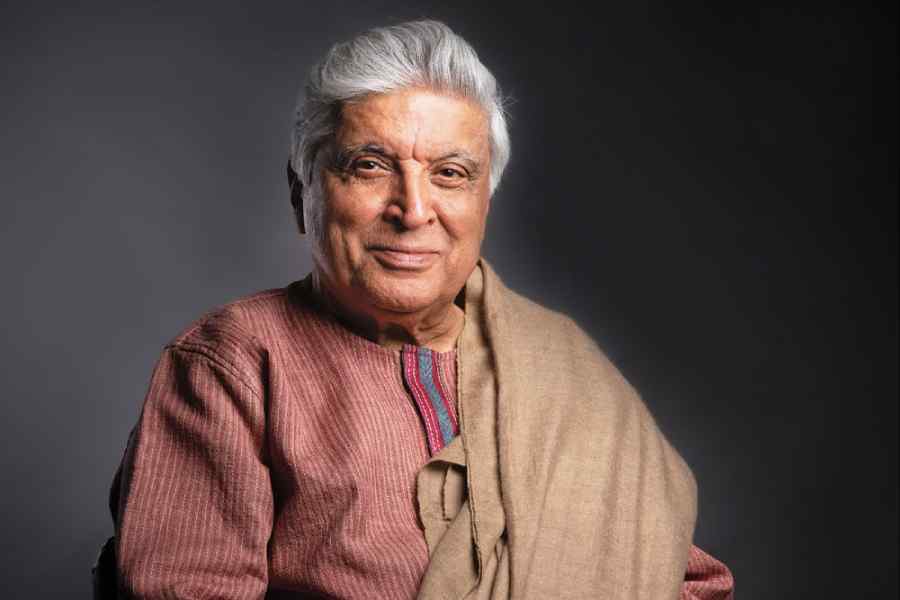Veteran poet-lyricist-screenwriter Javed Akhtar has revealed the late actor-filmmaker Guru Dutt had a profound influence on him so much so that he harboured a dream of becoming a director and even assisting him.
At a special session organised to pay tribute to the Hindi cinema legend as part of his centenary celebrations in Mumbai on Wednesday night, Akhtar (80) shared that his dream to work with Dutt remained unfulfilled.
“After my graduation I’ll go to the film industry and join Mr Guru Dutt for a couple of years and then I’ll become a director. When you’re 18-year-old things are simpler and easier, so that is what I had decided. It is so unfortunate that I came to Bombay (now Mumbai) in 1964, on October 4 and he passed away on October 10, so I could never ever see him," Akhtar said.
“I had really thought that I when I go (to Mumbai) somehow I’ll manage (to work with Guru Dutt) because (poet-lyricist) Sahir (Ludhianvi) sahab was a good friend of Guru Dutt and he had written songs for ‘Pyaasa’, I thought this connection will work. I had thought I’ll assist him for a while but it didn’t work,” he stated.
Akhtar, known for penning iconic films like “Sholay”, “Deewar”, “Zanjeer”, and “Don” alongwith Salim Khan, said he was impressed at how Dutt would communicate complex narratives through visuals.
"I was highly impressed by Guru Dutt in my college days, that when I was 17 or 18-year-old I used to refused to see films of certain superstars because I believed they’re bad actors, it means I had some choice. Guru Dutt had a deep impression on me as a teenager.
"We had great directors like Mehboob (Khan), Bimal Roy, but Guru Dutt was the first person who spoke through visuals. There were other directors who could give good performances, shoot at right locations, create right ambience in the film, and well-written films but talking through visuals is something that was taught to us by Guru Dutt,” Akhtar noted.
The session was attended by filmmakers like Sudhir Mishra, Hansal Mehta, and R Balki, and film critic-author Bhawanaa Sommaya, each echoing Akhtar’s sentiments of reverence for Dutt.
The event concluded with a special screening of “Pyaasa”, which was attended by Dutt’s family including, his granddaughters Gouri and Karuna Dutt, late actor Johnny Walker’s son Nasir, filmmaker Anubhav Sinha, actor Akshay Oberoi, and others.
Mishra reminisced about watching Dutt’s film, “Saheb Bibi Aur Ghulam” at least six times as a teenager, with his grandmother.
“Guru Dutt is an experience, he could see him again and again, at the age of 22 he would mean something else, and today he would mean something else. I keep revisiting him. There’s nothing in my life that I’ve done that is not influenced by him, and I haven’t measured upto to him, but I’m trying to.
"Every film that I’ve done, every shot that I’ve taken, every scene I’ve written, and song that I’ve tried to picturise, I can’t imagine it without Guru Dutt. He has taught us how to make films, how to see a scene, how to take a blueprint, which is a script, and he rewrite it in a film,” the filmmaker said.
Mehta revealed that during his FTII days in Pune in the early 1990s, he created a music video that he referred to as a “plagiarised” song sequence from Dutt's iconic film, “Kaagaz Ke Phool.” He candidly described his work as a “vulgar replication”, and added that he hopes to pay tribute to the late filmmaker someday by making a movie that talks about “heartbreak and love”.
“I grew up knowing about him through my closest friend, who was his nephew. I used to hear stories about his uncle. I discovered his (Dutt) films much later, ‘Pyaasa’ is the first film I saw and it left a lasting impression on me. More than the number of films I’ve made, I’ve had more heartbreaks, and love.
"Guru Dutt has taught me that pitying oneself can be beautiful, I began to think of self-sympathy as a virtue and that I should celebrate it, and that heartbreak is cinematic. I wish I can make a film that talks about heartbreak and love to pay tribute to the person who influenced me,” Mehta noted.
Balki said Dutt was the reference point for his 2022 movie, “Chup: Revenge of the Artist”, which depicted the pain of an artist who suffers from “wrong criticism”.
“We live in an era where resilience is celebrated more than sensitivity, and sensitivity with a little bit of luck can become luck and if not supported by luck, goes down. As the most sensitive artist, we love to celebrate a person who has fallen and come up. Guru Dutt to me is an epitome of sensitivity.
"He inspires me to remember sensitivity, it is important to feel vulnerable and not be understood by many people, you just go on. Today, the pressure is more on artists. The more I watch his films, I look at the vulnerability of the filmmaker, I never look at the craft," Balki stated.
As part of the centenary celebrations of Dutt, some of his most iconic films such as “Pyaasa” (1957), “Aar Paar” (1954), “Chaudhvin Ka Chand” (1960), “Mr & Mrs 55”, (1955), "Sahib Bibi Aur Ghulam" (1962) and “Baaz” (1953) will be screened across India from August 8 to 14 as part of the retrospective.
The restoration of these titles has been undertaken by the National Film Development Corporation (NFDC) and the National Film Archive of India (NFAI), along with Ultra Media and Entertainment Group, who holds the rights to these movies.
Except for the headline, this story has not been edited by The Telegraph Online staff and has been published from a syndicated feed.









